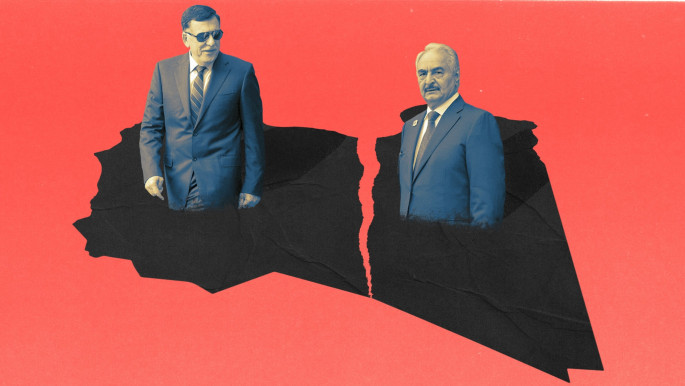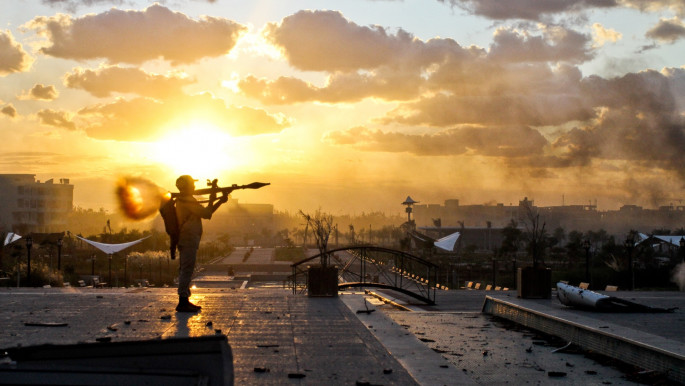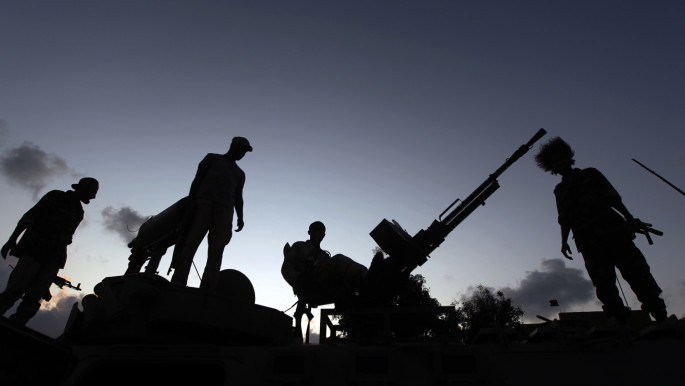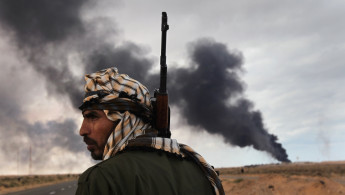Divided Europe: How the West lost influence in Libya's war
Futile peace-building efforts by Western powers and the inability to play a proactive role in the country have exposed ever deeper disagreements among key EU and Nato member states, leaving the initiative to non-EU players, such as Turkey, Russia and Arab countries.
Since the beginning of the Libyan crisis, foreign powers, including those from the European Union and Nato, have played a disruptive role, greatly contributing to the overall chaotic situation in the county.
Nato bombing campaigns led by France and the UK in 2011, which aimed to oust former dictator Muammar Gaddafi, pushed the once richest African country into chaos and despair, leading many to draw parallels with the same mistakes from the Iraq war.
Instead, all foreign powers followed their particular interests or aimed to disrupt the interests of their competitors by siding with one of two major factions in the country, providing them with political, financial, and technical support, and in some cases weapons, in violation of the UN arms embargo.
Disruptive role of foreign powers
Both sides in the civil war between the self-styled Libyan National Army (LNA) of General Khalifa Haftar and the internationally-recognised Government of National Accord (GNA) led by Prime Minister Fayez al-Sarraj have international support. Turkey, Italy and Qatar all side with the GNA in Tripoli, while Russia, Egypt and the United Arab Emirates (UAE), and until recently France, back Haftar.
 |
After nine years of fighting in Libya, Western powers have failed to stop the fragmentation of the country |  |
Despite the highly disputed role of some European countries - notably the UK, France and Italy - the absence of any joint European initiative in Libya is concerning, as the country, due to its proximity, matters greatly for Europe. Despite major stakes, the European Union seems to be completely impotent and marginalised in its approach to Libya, as is the case in Syria, leaving the UAE, Turkey, Egypt and Russia to take the initiative.
The increased presence of Russia and Turkey, in particular, has been seen as a game-changer. While Haftar's Russian-backed offensive on Tripoli was underpinned by Russian mercenaries and funds, massive Turkish support and the dispatch of Syrian mercenaries to the Tripoli-based GNA administration completely neutralised Haftar's advancement, pushing his forces back east.
Powerless Europe
However, the apparent inability of European powers to act is highly surprising, as the ongoing war greatly endangers European stability and security, while indirectly affecting internal political dynamics within the EU. The migrant crisis and terrorist threats have shaped the political structure of the continent and contributed to the rise of right-wing populist movements and political parties in Europe, with France, Malta, and Italy being particularly exposed to instability in Libya.
 |
|
| Read more: Is Libya on the road to de facto partition? |
With its almost 2,000 kilometres of coastline and vast uncontrolled spaces, the country has become a Mecca for human trafficking and the proliferation of terrorist groups, which operate throughout the fragile Sahel region.
Some hoped that the EU would exploit the opportunity provided by the Covid-19 pandemic and take initiative in order to push back Russia and Turkey from Libya. There were also ever louder voices suggesting that the EU should this time use some hard power means and deploy troops on the ground rather than only focusing on providing humanitarian aid.
Prior to the pandemic, the EU tried to lead a diplomatic initiative, at the Berlin summit in January, but failed to achieve any meaningful progress as participants of the summit continued to send weapons to Libya.
In fact, any joint efforts to tackle the crisis and limit the growing influence of non-EU actors have been often torpedoed by EU member states, which have pursued their own unilateral interests, notably France and Italy. Until last year, both were effectively European rivals in Libya. Although Italy remains an ally of the Tripoli-based government, the most powerful GNA ally is Turkey, which has sent its own contingent of several thousand Syrian mercenaries, as well as armoured drones and sophisticated air defence systems.
 |
Foreign powers have played a disruptive role in Libya's war, contributing to the overall chaotic situation in the county |  |
Prior to its military engagement, Ankara signed a maritime border agreement with the GNA, which triggered a heated international debate over exploitation of rich hydrocarbon reserves in the Eastern Mediterranean. The agreement has also become a source of friction with Cyprus and Greece, as well as within Nato. Moreover, Ankara has taken the initiative while the EU floundered, perceiving the Covid-19 crisis as an excellent chance to score important points.
France-Turkey rivalry
The clashing interests of Turkey and France, meanwhile, have created a geopolitical competition between two countries beyond Libya, and such a rivalry may have a serious impact on Nato. The two Nato members have traded accusations and insults after they almost clashed near the Libyan coast, when France accused the Turkish side of targeting a French military vessel that was trying to inspect a Tanzanian-flagged cargo ship, Cirkin, carrying Turkish weapons to Libya.
France accused Ankara of blocking truce efforts in Libya and breaking the UN arms embargo, and also recently urged talks among Nato allies about Turkey's "aggressive" role in Libya. France also decided to suspend its navy from Nato's Operation Sea Guardian. The row has also hampered already tense relations between Nato members and its ability to act as a unified and efficient organisation.
 |
|
| Read more: France and Turkey's growing rivalry in the Middle East |
Moreover, it seems that the words of French President Macron, who once said that Nato is "brain dead" are becoming a reality. On the other hand, the inner struggles within the EU and Nato, have given the opportunity to non-EU actors such as Turkey, Russia and Arab states to fully exploit the situation.
According to Dr. Mustafa Aydin, a prominent Turkish academic, writer, columnist, and president of the International Relations Council of Turkey, France is now trying to get the EU (and Nato) behind its position, but most probably will fail again as its policies are seen by many European nations as not furthering international peace and stability, while promoting French national interests against them.
Is Nato obsolete?
Riccardo Fabiani, North Africa Project Director at the International Crisis Group, struggles to see how Nato could patch up the the crisis between France and Turkey, given that the US are refusing to play a traditional leadership role within Nato and the MENA region.
 |
Despite major stakes, the European Union is impotent and marginalised in its approach to Libya's conflict |  |
"In this political and security vacuum, it is only inevitable that countries like France and Turkey end up pursuing their national interests and clashing with each other," he told The New Arab. He also thinks that this situation clearly reflects that Nato has become an empty shell, whose crisis is only exacerbated and highlighted by the antagonism between Paris and Ankara.
Nato has so far avoided involvement in disputes between its two members and this will continue in the case of the Ankara-Paris dispute, according to Dr. Aydin. He also pointed out that Nato could only make decisions with the approval of all its members, and therefore does not expect the alliance's further involvement in Libya or the Mediterranean unless there are other earlier agreements outside Nato on how to move forward.
 |
|
| Read more: After Haftar: What's next in Libya's conflict? |
For Turkey, Libya looks too tempting to simply be left to other players. Barah Mikaïl, the founding director of Stractegia, a Madrid-based centre specialised on the Geopolitics of the Middle East and North Africa, explained that Turkey knows exactly what it can get out of its role in the war.
Namely, energy prospects in the Mediterranean, a stake in the reconstruction of Libya, providing arms to Libya and other countries in the region, and influence from its role backing the GNA to demonstrate strategic assets and a greater capacity than many EU countries.
So why say no to all of this? In other words, according to Mikaïl, Turkey has made it quite clear that it can benefit from its current strategy, and that nobody will wage a war against it because of its policies in Libya, so why step back?
In similar fashion, Professor Hüseyin Işiksal from the Department of International Relations at the Northern Cyprus-based Near East University stated that in the post-Covid-19 order, Nato has a very limited role in resolving either Turkish-French tensions or the Syrian and Libyan conflicts.
In his view, the upcoming US elections, the socio-political implications of the Covid-19 pandemic, clashing interests of Nato member states and the vacuum left by the US within Nato are all severely restricting the organisation's effectiveness to tackle these crises.
After all, Nato is seen as a source of Libya's current problems, Mikaïl says, and reasserting a role in the country would simply add to Nato's problems and lack of credibility.



